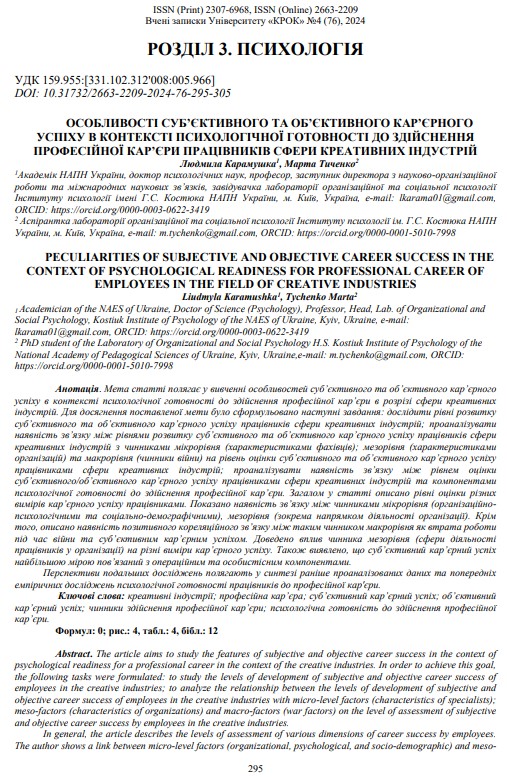PECULIARITIES OF SUBJECTIVE AND OBJECTIVE CAREER SUCCESS IN THE CONTEXT OF PSYCHOLOGICAL READINESS FOR PROFESSIONAL CAREER OF EMPLOYEES IN THE FIELD OF CREATIVE INDUSTRIES
DOI:
https://doi.org/10.31732/2663-2209-2024-76-295-305Keywords:
creative industries, professional career, subjective career success, objective career success, career factors, psychological readiness for a professional careerAbstract
The article aims to study the features of subjective and objective career success in the context of psychological readiness for a professional career in the context of the creative industries. In order to achieve this goal, the following tasks were formulated: to study the levels of development of subjective and objective career success of employees in the creative industries; to analyze the relationship between the levels of development of subjective and objective career success of employees in the creative industries with micro-level factors (characteristics of specialists); meso-factors (characteristics of organizations) and macro-factors (war factors) on the level of assessment of subjective and objective career success by employees in the creative industries.
In general, the article describes the levels of assessment of various dimensions of career success by employees. The author shows a link between micro-level factors (organizational, psychological, and socio-demographic) and meso-level factors (in particular, the direction of the organization's activities). In addition, a positive correlation between macro-level factors such as job loss during the war and subjective career success is described. The influence of the meso-factor (the sphere of activity of employees in the organization) on various dimensions of career success is proved. It is also found that subjective career success is most closely related to operational and personal components. Prospects for further research include synthesizing the previously analyzed data and previous empirical studies of employees' psychological readiness for a professional career.
Downloads
References
Карамушка, Л. М. (2000). Психологія управління закладами середньої освіти: Монографія. Київ: Ніка-центр.
Карамушка, Л. М., & Тиченко М. Є. (2023). Методики дослідження психологічних особливостей професійної кар’єри: психологічний практикум. Київ: Інститут психології імені Г.С. Костюка НАПН України.
Тиченко, М. Є. (2022). Психологічні особливості здійснення професійної кар’єри фахівцями у сфері креативних індустрій. Організаційна психологія. Економічна психологія, 2(26), 121-130.
Тиченко, M. (2024). Когнітивний компонент психологічної готовності до здійснення професійної кар’єри працівників сфери креативних індустрій: особливості та чинники. Київський журнал сучасної психології та психотерапії, 8, 130-146.
Ніколаєва, О., Онопрієнко, А., Таран, С., Шоломицький, Ю., & Яворський, П. (2021). Креативні індустрії: вплив на розвиток економіки України. Київ: КШЕ. https://kse.ua/wp-content/uploads/2021/04/KSE-Trade-Kreativni-industriyi-Zvit.pdf
Самборська, О. Ю., & Климчук, О. В. (2023). Негативний вплив війни на зайнятість та доходи українців. Інноваційна економіка, (3-2023), 63-69.
Greenhaus, J.H., Parasuraman, S., & Wormley, W.M. (1990). Effects of race on organizational experiences, job performance evaluations, and career outcomes. Academy of management Journal, 33(1), 64-86.
Goodwin, K. (2019). Developing self-efficacy and career optimism through participation in communities of practice within Australian creative industries. Australian Journal of Career Development, 28(2), 122-131.
Russo, A., Zammitti, A., & Zarbo, R. (2023). Career readiness and well-being: The mediation role of strategies for coping with career indecision. Australian Journal of Career Development, 32(1), 14-26.
Seibert, S. E, Kraimer, M. L., & Liden, R. C. (2001). A social capital theory of career success. Academy of Management Journal, 44, 219-237.
Spurk, D., Abele, A. E., & Volmer, J. (2015). The career satisfaction scale in context: A test for measurement invariance across four occupational groups. Journal of Career Assessment, 23(2), 191-209.
Volmer, J., Spurk, D. (2011). Protean and boundaryless career attitudes: relationships with subjective and objective career success. Zeitschrift für Arbeitsmarkt. Forschung. Journal for Labour Market Research, Springer, Heidelberg, 43(3), 207-218. http://dx.doi.org/10.1007/s12651-010-0037-3

Downloads
Published
How to Cite
Issue
Section
License

This work is licensed under a Creative Commons Attribution-NonCommercial 4.0 International License.

